Related Research Articles

James William Buffett was an American singer-songwriter. He was known for his tropical rock sound and persona, which often portrayed a lifestyle described as "island escapism" and promoted enjoying life and following passions. Buffett recorded many hit songs, including those known as "The Big 8": "Margaritaville" (1977), which is ranked 234th on the Recording Industry Association of America's list of "Songs of the Century"; "Come Monday" (1974); "Fins" (1979); "Volcano" (1979); "A Pirate Looks at Forty" (1974); "Cheeseburger in Paradise" (1978); "Why Don't We Get Drunk" (1973); and "Changes in Latitudes, Changes in Attitudes" (1977). His other popular songs include "Son of a Son of a Sailor" (1978), "One Particular Harbour" (1983), and "It's Five O'Clock Somewhere" with Alan Jackson (2003). Buffett formed the Coral Reefer Band in 1975.

Alan Eugene Jackson is an American country music singer-songwriter. He is known for performing a style widely regarded as "neotraditional country", as well as writing many of his own songs. Jackson has recorded 21 studio albums, including two Christmas albums, and two gospel albums, as well as released three greatest-hits albums.
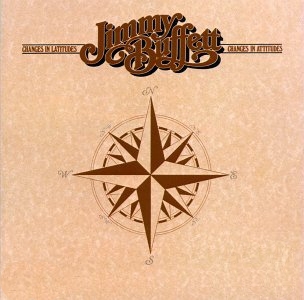
Changes in Latitudes, Changes in Attitudes is the seventh studio album by American popular music singer-songwriter Jimmy Buffett. This is his breakthrough album, which remains the best-selling studio album of Buffett's career, and contains his biggest single, "Margaritaville". It was initially released in January 1977 as ABC AB-990 and rereleased on its successor label, MCA.
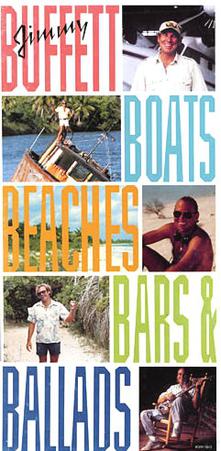
Boats, Beaches, Bars & Ballads is a four disc compilation box set of Jimmy Buffett and the Coral Reefer Band's greatest hits, rarities, and previously unreleased songs. Released in 1992, the collection received Recording Industry Association of America quadruple platinum certification in 2001.

Son of a Son of a Sailor is the eighth studio album by American singer-songwriter Jimmy Buffett. It was initially released in March 1978 as ABC Dunhill AA-1046 and later re-released on its successor label, MCA.
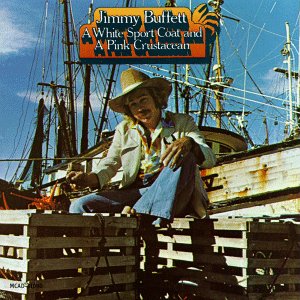
A White Sport Coat and a Pink Crustacean is the third studio album by American singer-songwriter Jimmy Buffett. It was released on June 4, 1973, as his first album for Dunhill.

Living and Dying in ¾ Time is the fourth studio album by American singer-songwriter Jimmy Buffett. It is the second major label album in Buffett's Don Gant-produced "Key West phase". It was initially released in February 1974 as his second album for Dunhill Records. It contains the song "Come Monday", his first top-40 hit single.

The discography of American singer-songwriter Jimmy Buffett consists of 32 studio albums, 11 compilations albums, 14 live albums, one soundtrack album, and 67 singles. Buffett was known for his unique style of music called "Gulf and Western", which combines elements of country, folk rock, pop, and Caribbean, with tropical lyrical themes. Buffett has sold over 20 million albums worldwide and had a net worth of $550 million.

Live at Fenway Park is a live album by American singer-songwriter Jimmy Buffett. It is one of a number of Jimmy Buffett sound board live albums recorded directly from the mixing console without further editing, in this sense resembling bootleg recordings.
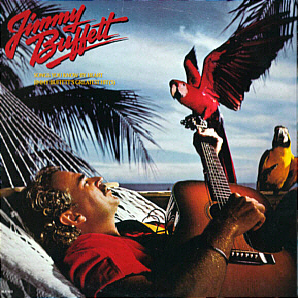
Songs You Know by Heart: Jimmy Buffett's Greatest Hit(s) is the 18th album and the first greatest hits compilation by American singer-songwriter Jimmy Buffett. It was released in 1985. The parenthetical "s" in the subtitle alludes to the status at the time of "Margaritaville" as Buffett's single large chart hit.

You Had to Be There is a live double album by the American popular music singer-songwriter Jimmy Buffett. It was originally released in October 1978 as ABC AK-1008/2 and later re-released on ABC's successor label MCA. It is the first of Buffett's many live albums and his tenth album overall. The original vinyl print album included a fold-out poster showing many photos taken during the 1978 Cheeseburger in Paradise Tour.
Jimmy Buffett sound board live albums are a series of live albums by American singer-songwriter Jimmy Buffett recorded directly from the sound board without further editing thus resembling bootleg recordings. The albums were recorded at various concerts throughout the United States and represent typical Buffett live shows of their era with most of the albums recorded during Buffett's 2003 Tiki Time Tour. They have been released on compact disc on Buffett's own Mailboat Records distributed by RCA.

Live in Auburn is a live album by the American singer-songwriter Jimmy Buffett and is one of number of Jimmy Buffett sound board live albums recorded directly from the mixing console without further editing, thus resembling bootleg recordings.

Live by the Bay is a 1986 direct-to-video concert film of American popular music singer-songwriter Jimmy Buffett and the Coral Reefer Band. It was released in 1986 by MCA Entertainment. The 87-minute film was recorded from back to back concerts in Miami, Florida on August 16 and 17, 1985, at Miami Marine Stadium and is the first concert video released by Buffett. Miami Vice star Don Johnson introduced Buffett to the crowd. A brief rain shower during the middle of the Friday night show prompted Buffett to retreat to his sailboat and caused a majority of the final video release to feature the Saturday night show. After the rain cleared on Friday, the band played Little Feat's "Dixie Chicken" to demonstrate the equipment still functioned before Buffett returned to the stage.
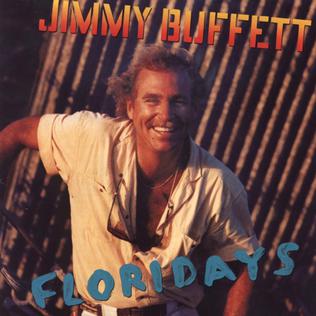
Floridays is the fifteenth album by American popular music singer-songwriter Jimmy Buffett. It was released in June 1986 as MCA 5730 and was produced by Coral Reefer Band member Michael Utley and recorded and mixed by Jay Rifkin. The title of the album is taken from the 1941 poetry collection of the same name by Don Blanding. The album marks the end of Buffett's shift toward a more country sound that characterized his previous two releases and a return to a sound closer to that of his late 1970s and early 1980s output. The album features a wider variety of musical instruments than was typical for Buffett's previous works, notably several songs with strings and horns. His daughter Savannah Jane Buffett is credited for playing mini-conga on the album. It was also his last studio album to feature Jimmy Buffett's trademark mustache, before he shaved it off for the next album Hot Water in 1988.

Feeding Frenzy: Jimmy Buffett Live! is a live album by American popular music singer-songwriter Jimmy Buffett. It was initially released in October 1990 as MCA 10022. It is the second of Buffett's many live albums.
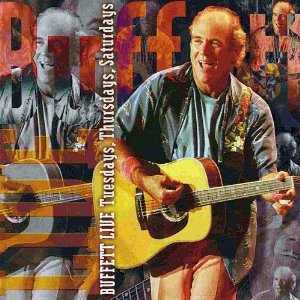
Buffett Live – Tuesdays, Thursdays, Saturdays is a live album by American popular music singer-songwriter Jimmy Buffett. It was released on November 9, 1999. The album's material was culled from several concerts during the Don't Stop That Carnival Tour (1998) and Beach House on the Moon Tour (1999). It was the first live album by Buffett since Feeding Frenzy was released in October 1990 and Mailboat Records' debut release.
"I Still Miss Someone" is a song co-written by Johnny Cash and his nephew Roy Cash, Jr. and originally recorded by American country music singer Johnny Cash. He first recorded it in 1958 as the B-side to "Don't Take Your Guns to Town".
"The Great Filling Station Hold Up" is a song written and performed by American popular music singer-songwriter Jimmy Buffett. It was first released on his 1973 album A White Sport Coat and a Pink Crustacean and was his first single from that album. The single reached No. 58 on the US Country chart in 1973.
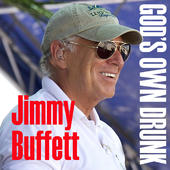
"God's Own Drunk" is a monologue by Lord Buckley that musicians have since adapted into different types of songs; most notably, Jimmy Buffett, who first recorded his rendition for Living and Dying in ¾ Time and has since released a digital download single of a live performance in 2011. Buffett's version was a concert staple and even regarded as his theme before "Margaritaville"'s popularity, until he was forced to stop playing it after being sued by Buckley's son, Dick Buckley Jr., for copyright infringement.
References
- ↑ Bob Anderson. "Jimmy Buffett." High Times . December 1976. At CoBO.org.
- ↑ Boats, Beaches, Bars & Ballads liner notes.
- 1 2 "Blue Lyric in Country Release Gets Airplay". Billboard. 1973-05-19. p. 39. Retrieved July 18, 2009.
- ↑ Wood, Gerry (1976-11-27). "Colorado Country". Billboard. p. C-12. Retrieved July 18, 2009.
- ↑ Stambler, Irwin; Grelun Landon (2000). "Buffett, Jimmy". Country Music: The Encyclopedia (3rd ed.). Macmillan. p. 58. ISBN 0-312-26487-9 . Retrieved 2009-07-18.